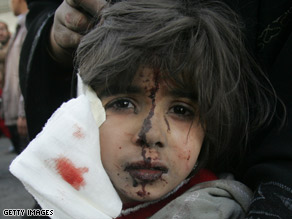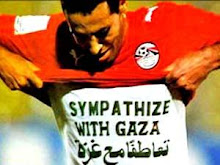By IBRAHIM BARZAK and CHRISTOPHER TORCHIA, Associated Press Writers Ibrahim Barzak And Christopher Torchia, Associated Press Writers –
29 mins ago
GAZA CITY, Gaza Strip – Israeli ground forces made their deepest foray yet Sunday into Gaza's most populated area, with tanks rolling into residential neighborhoods and infantry fighting urban warfare in streets and buildings with Hamas militants who kept up their rocketing of southern Israel.
An Israeli army spokeswoman said residential neighborhoods in Gaza are riddled with homemade bombs and booby traps, including mannequins placed at apartment entrances to simulate militants and rigged to explode if soldiers approach.
The army "is advancing more into urban areas," said the spokeswoman, Maj. Avital Leibovich. "Since the majority of the Hamas militants are pretty much in hiding in those places, mainly urban places, then we operate in those areas."
Late Sunday, dense plumes of smoke from explosions rose over Gaza City and heavy gunfire was heard just south of the city. Early Monday, Israeli navy gunboats fired more than 25 shells at Gaza City, setting fires and shaking office buildings, including the local bureau of The Associated Press. The military said that in general, the targets are Hamas installations but had no immediate information about the shelling that began just after midnight.
Gaza medical officials say at least 870 Palestinians, about half of them civilians, have been killed in the conflict that began Dec. 27 with Israeli airstrikes on Hamas buildings, as well as suspected rocket launch sites and smuggling tunnels on the Egyptian border. Thirteen Israelis, including 10 soldiers, have died.
German and British envoys pressed efforts to negotiate an end to the war even though Israel and Hamas have ignored a U.N. Security Council resolution calling for an immediate and durable cease-fire.
Outgoing Prime Minister Ehud Olmert said Israel had made progress in its objectives in the Gaza offensive but was not finished yet.
"Israel is nearing the goals that it set for itself," Olmert said. "However, further patience, determination and effort are necessary in order to achieve those goals in a way that will change the security reality in the south."
While Olmert's comment signaled no immediate end to the offensive, it indicated that Israel is wary of an open-ended conflict with an unclear agenda. Israel wants to end years of rocket attacks by Hamas on its southern population, a complex goal that could require Egyptian or international help in shutting off routes to smuggle weapons into Gaza from Egypt.
Hamas, in turn, demands that Israel open Gaza's blockaded borders as part of any halt to the fighting. Such a measure would relieve economic pressure on the destitute territory but also strengthen Hamas's control of Gaza, an odious prospect for Israelis who fear a halt to the fighting will just give Hamas another opportunity to re-arm.
In Cairo, Egypt's state-owned news agency reported progress in truce talks with Hamas, but provided no specifics. The Middle East News Agency quoted an unnamed Egyptian official as saying talks between the nation's intelligence chief, Omar Suleiman, and Hamas envoys were "positive."
Palestinian medical officials reported about 60 deaths on Sunday, including 17 who had died of wounds suffered on previous days. Most of those killed Sunday were noncombatants, medical officials said, including four members of one family killed when a tank shell hit their home near Gaza City, and a 10-year-old girl killed in a similar attack.
Palestinian witnesses said Israeli troops moved to within half a mile of Gaza City's southern neighborhoods, and within a quarter mile of the northern neighborhood of Sheikh Ajleen.
Firefights in Sheikh Ajleen erupted before dawn as Israeli forces advanced toward Gaza City, home to 400,000 people, Palestinian witnesses said.
Gunfire subsided in the afternoon, with the Israelis in control of some buildings on the neighborhood's outskirts. Israeli tanks later withdrew.
"We are safe, but we don't know for how long," said Khamis Alawi, 44, who huddled with his wife and six children in their kitchen overnight. He said bullets riddled his walls and several came in through the windows.
Military analysts say Israeli troops are probing territory, clearing buildings and moving around regularly, rather than digging into positions that would allow Hamas militants to get a fix on their whereabouts and lay ambushes. Israel risks losing the advantage of armor and heavy firepower in urban settings that the militants know well.
Israeli military footage showed soldiers walking around a zoo in the Zeitoun neighborhood of Gaza City two days ago. The footage showed caged birds and a white cable identified as an explosive detonation cord, part of an alleged booby trap set by Hamas.
An Israeli airstrike destroyed a mosque and Islamic school in Rafah, on the border with Egypt. Hours later, men and boys clambered over the wreckage, and one man held aloft the remains of a Quran recovered from the debris.
Israeli has accused Hamas of launching attacks from mosques and schools and using them to hide weapons. Israel says Hamas fighters are wearing civilian clothes and endangering civilians by operating in residential areas.
The Israeli military said it hit more than 40 Hamas militants on Sunday, but did not specify whether they were killed or wounded.
International aid groups say Israel must do more to ensure the safety of civilians. They note that civilians are in many cases unable to flee to safe places in Gaza, and are essentially trapped because the territory's exits are closed.
The U.N. agency in charge of Palestinian refugees has resumed operations after suspending them because of Israeli attacks on its convoys. U.N. aid vehicles were moving around Gaza on Sunday and U.N. workers tended to about 30,000 people in shelters, but aid officials warned that the dire security situation made it impossible to operate at full capacity.
"This is a very small fraction of what we normally do in the Gaza Strip," said Filippo Grandi of the U.N. Relief and Works Agency. "Things might get worse."
Israel has warned Gaza residents of a wider offensive. On Sunday, it dropped leaflets urging Gaza residents to report the whereabouts of Hamas fighters, providing a phone number to call.
Israel's chief military spokesman, Brig. Gen. Avi Benayahu, said the army has sent more reserve units into the Gaza Strip.
In other fighting, Hamas militants launched at least 24 rockets at southern Israel, lightly injuring three people. Rockets hit an empty kindergarten and a children's playground in the city of Ashdod.
The rockets have disrupted life for hundreds of thousands of terrified people who rush into bunkers and basements at the sound of warning sirens. Four people have died in rocket attacks.
However, thousands of children in southern Israel returned to school Sunday for the first time in two weeks. Schools had been closed since the beginning of the offensive, but the military said schools that have been sufficiently fortified against attack could open.
British Mideast envoy Tony Blair and Germany's top diplomat visited Jerusalem Sunday, and Israel planned to send a senior defense official this week to Egypt, which is trying to broker a truce.
Blair met Olmert and said a plan to end the fighting must include a halt to weapons smuggling and the opening of border crossings into Gaza. He said urgency was vital because "every day this action continues there are more people that die."
Germany's foreign minister, Frank-Walter Steinmeier, appeared at a news conference with his Israeli counterpart, Tzipi Livni, in Jerusalem.
"The shooting of Qassam rockets and other weapons must be stopped and the smuggling of new weapons to the Gaza Strip for re-arming, or even to improve the weapons of Hamas, must be stopped," Steinmeier said.
___
Barzak reported from Gaza City and Torchia from Jerusalem. AP reporter Karen Zolka contributed to this report from Jerusalem.































